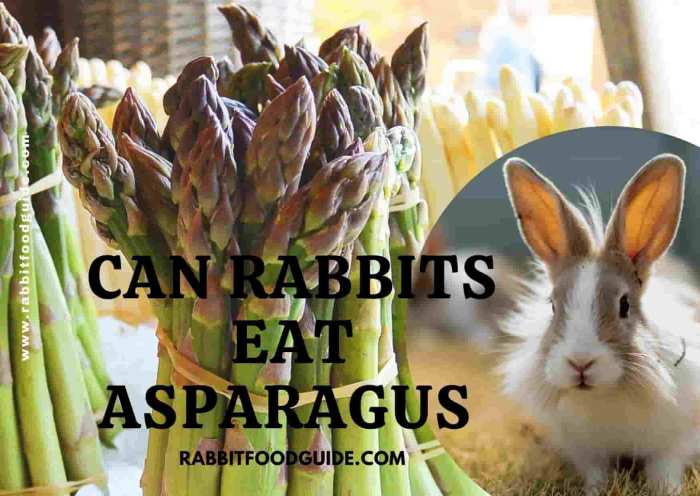Asparagus, a spring vegetable packed with nutrients, is a popular choice for human consumption. But can our furry friends, rabbits, enjoy this delicacy as well? In this comprehensive guide, we will delve into the nutritional value of asparagus, its potential health benefits for rabbits, and the safe preparation and consumption guidelines.
We will also explore suitable alternatives to asparagus, ensuring a well-rounded understanding of this topic.
Rabbits, as herbivores, have a unique digestive system that requires a specific diet. Understanding what they can and cannot eat is crucial for their health and well-being. Let’s embark on a journey to discover the suitability of asparagus for our beloved rabbits.
Nutritional Value of Asparagus

Asparagus is a nutrient-dense vegetable packed with an array of vitamins, minerals, and antioxidants that contribute to overall well-being. Its nutritional profile sets it apart from other vegetables, making it a valuable addition to a balanced diet.
Asparagus is particularly rich in:
Vitamins
- Vitamin K: Essential for blood clotting and bone health.
- Vitamin A: Supports vision, immune function, and skin health.
- Vitamin C: A powerful antioxidant that boosts immunity and collagen production.
- Vitamin E: Protects cells from damage caused by free radicals.
- Vitamin B9 (Folate): Vital for cell growth and development, especially during pregnancy.
Minerals
- Potassium: Regulates fluid balance and blood pressure.
- Iron: Essential for red blood cell production.
- Manganese: Supports bone formation and metabolism.
- Phosphorus: Important for bone and teeth health.
- Calcium: Essential for strong bones and teeth.
Antioxidants
- Glutathione: A powerful antioxidant that protects cells from oxidative damage.
- Rutin: An antioxidant that strengthens blood vessels and reduces inflammation.
- Quercetin: An antioxidant with anti-inflammatory and anti-cancer properties.
Health Benefits of Asparagus for Rabbits
Asparagus offers several health benefits for rabbits due to its nutritional composition. The high fiber content aids in digestive regularity and prevents gastrointestinal issues. The presence of potassium supports urinary tract health, reducing the risk of urinary tract infections. Furthermore, the antioxidants in asparagus strengthen the immune system, protecting rabbits from various diseases.
Digestive Support
The high fiber content in asparagus promotes digestive health in rabbits. Fiber aids in the formation of healthy stools, preventing constipation and diarrhea. It also helps regulate the movement of food through the digestive tract, ensuring proper digestion and nutrient absorption.
Urinary Tract Health
Asparagus contains a significant amount of potassium, an essential mineral for maintaining urinary tract health. Potassium helps regulate fluid balance in the body, preventing the formation of urinary crystals and reducing the risk of urinary tract infections.
Immune System Strengthening
Asparagus is rich in antioxidants, such as vitamin C and beta-carotene. These antioxidants help neutralize free radicals, which can damage cells and contribute to various diseases. By strengthening the immune system, asparagus helps protect rabbits from infections and diseases.
Safe Preparation and Consumption of Asparagus for Rabbits
To safely prepare and feed asparagus to rabbits, it is crucial to follow proper guidelines. Washing, cutting, and determining appropriate portion sizes are essential considerations.
Before feeding asparagus to rabbits, thoroughly rinse it under cold water to remove any dirt or debris. Cut the asparagus into small, bite-sized pieces to prevent choking hazards. The portion size should be limited to no more than 1-2 tablespoons per rabbit, twice a week, to avoid digestive issues.
Potential Risks and Mitigation
While asparagus is generally safe for rabbits, certain potential risks should be considered. Some rabbits may experience digestive upset, such as gas or diarrhea, if they consume too much asparagus. Additionally, some rabbits may be allergic to asparagus, which can cause skin irritation or respiratory problems.
To mitigate these risks, it is essential to introduce asparagus gradually into a rabbit’s diet, starting with small amounts and monitoring their response. If any adverse reactions occur, discontinue feeding asparagus and consult with a veterinarian.
Alternatives to Asparagus for Rabbits
While asparagus is a nutritious treat for rabbits, it should not be their primary source of food. Consider these alternatives that offer similar nutritional benefits:
Dandelion Greens
Dandelion greens are an excellent source of vitamins A, C, and K, as well as calcium and iron. They also contain fiber, which is essential for a healthy digestive system.
Kale
Kale is another nutrient-rich option for rabbits. It is high in vitamins A, C, and K, as well as calcium, potassium, and fiber.
Romaine Lettuce
Romaine lettuce is a good source of vitamins A, C, and K, as well as calcium and fiber. However, it is lower in nutrients than dandelion greens and kale.
When choosing alternatives to asparagus, consider the nutritional needs of your rabbit and consult with a veterinarian for guidance.
Last Word
In conclusion, asparagus can be a nutritious and beneficial addition to a rabbit’s diet when fed in moderation and prepared safely. Its high fiber content supports digestive health, while its antioxidants and vitamins contribute to overall well-being. However, it is essential to introduce asparagus gradually and monitor your rabbit for any adverse reactions.
If you have any concerns, consult your veterinarian for personalized advice.
By providing a balanced and varied diet that includes asparagus and other suitable vegetables, you can ensure your rabbit’s nutritional needs are met and their overall health is maintained.
Questions and Answers
Can rabbits eat asparagus every day?
No, asparagus should not be fed to rabbits daily. It is recommended to offer it as an occasional treat due to its high fiber content, which can lead to digestive upset if consumed excessively.
What is the ideal portion size of asparagus for rabbits?
A small handful of asparagus tips, approximately 1-2 tablespoons, is an appropriate portion size for rabbits.
Can baby rabbits eat asparagus?
No, baby rabbits under 12 weeks old should not be given asparagus as their digestive systems are still developing and may not be able to handle the high fiber content.
What are some alternatives to asparagus for rabbits?
Suitable alternatives to asparagus that provide similar nutritional benefits include dandelion greens, kale, romaine lettuce, and celery.